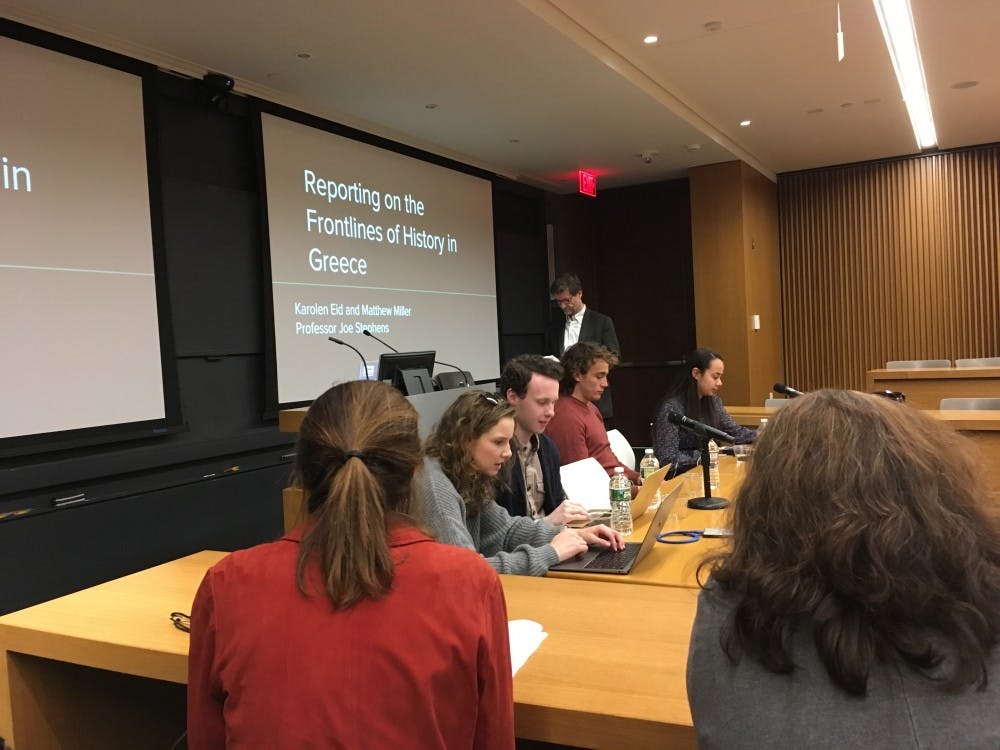“Inside the Orange Bubble [of the University] is not necessarily the best place to cover international events,” said Joe Stephens, as he opened for the panelists during Session IX of the Mellon-Sawyer Journalism Seminar Series.
Stephens, Ferris Professor of Journalism in Residence and director of the Program in Journalism, explained that by offering journalism courses that travel outside of the University and outside of the United States, students are provided with the opportunity to serve as international correspondents in the field.
The panelists were four University undergraduate students who spent time abroad reporting on the international refugee and migrant crisis.
Two of the panelists participated in the 2018 summer program on the island of Lesbos, Greece, under the supervision of Professor Stephens. One was Karolen Eid ’21, who opened the panel discussion by reflecting on the process of finding balance between compassion and emotional detachment.
Eid is a staff writer for The Daily Princetonian.
“More important than developing these relationships is to tell these stories objectively,” Eid said. “That was our main priority. That is how we add our version of justice to this situation.”
Matthew Miller ’19 followed by commenting on how the Turkey-Greece refugee crisis radically changed the sociopolitical landscape of Greek life. He recounted the ways that overcrowding in the Moria refugee camp has put pressure on the small town of Moria.
Miller recalled that the students had to have an extensive conversation about the best ways to write about local tensions. They collaborated to try and find ways to accurately reflect the conflict.
Following Miller and Eid, Ferris Professor of Journalism in Residence Deborah Amos introduced her students from the shorter, eight-day journalism abroad program in Canada.
Marcia Brown ’19 talked about her visit to a U.S.-Canada border called Emerson. From the kinds of crops she saw to the kind of political rhetoric she heard when people talked about migrants, she said the little town reminded her of Midwestern America.
Brown is the former editor-in-chief of the ‘Prince.’
Although Canadians have a reputation for being generally welcoming to refugees, Brown said that the UN refugee council claimed that this situation is completely different from where it was two years ago. Brown found in her interviews that anti-migrant sentiment continues to grow, especially in small towns like Emerson.

Jack Allen ’21, whose final project in Amos’s class focused on Newcomer Kitchen, an NGO food and employment group, also recalled being able to see firsthand the growing response to the migrant crisis.
Allen is a writer for the Prospect section of the ‘Prince.’
“We were in the midst of the protests, which was a really interesting thing to see,” Allen said. “It was very cool to see both the people who said ‘refugees welcome’ and the far-right response to that as well.”
Since their time abroad, the undergraduate student panelists have taken the opportunity to reflect on their experiences and the importance of journalism.
“I realized that no issue is too big if you start to chip away at it and ask a lot of questions,” Eid said. “Never be intimidated by something that seems larger than what you see as your own abilities.”
The panel took place in A71 Lewis A. Simpson International Building at 4:30 p.m. on Tuesday, March 26.








